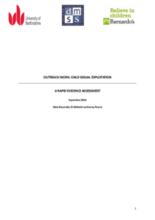

Displaying 1311 - 1320 of 1649
Save the date for the 2016 Conference of the International Step by Step Association (ISSA), "Early Childhood in Times of Rapid Change." The Conference will unite all aspects of the early childhood workforce to explore the impact of shift
This article discusses literature on Reslient Therapy in addition to the results of research on how its use can be a positive tool for kinship care.
This position provides child protection technical leadership in the design and development of programs for children in countries in conflict, crisis, post-conflict and post-crisis settings across the world, with a specific focus on research, monitoring and evaluation for child protection.
This statistical release provides information about looked after children in England for the year ending 31 March 2016, including where they are placed, their legal status, the numbers starting and ceasing to be looked after, and the numbers who go missing or are away from their placement without authorisation.
This article in the Guardian reports that French children’s services are struggling to cope with a dramatic surge in unaccompanied refugee children who have abandoned plans to travel to the UK and now want to remain in France.
By drawing on an empirical study on placing disabled children for adoption, the article seeks to demonstrate the practical application of critical realist by combining its Retroductive framework with Grounded Theory methods.
This article from the BBC states that foster care workers vote to form first foster care workers union.
This article discusses how children's political agency manifests in everyday life. It shows how children who become aware of their legal status as 'deportable' reject this subject position and offer their own definitions of who they are and where they belong.
This article discusses how children’s political agency manifests in everyday life. It shows how children who become aware of their legal status as ‘deportable’ reject this subject position and offer their own definitions of who they are and where they belong. Simultaneously, it is argued that children with varying degrees of knowledge about their legal status also express political agency through their struggle to sustain the inclusion they experience.
This briefing is based on a rapid review of the available literature on outreach work with children and young people. It is intended to provide the ReachOut project with an overview of different approaches to outreach; what it generally aims to achieve; what distinguishes it from centre-based work and how it is applicable to children and young people involved in, or at risk of, child sexual exploitation.


